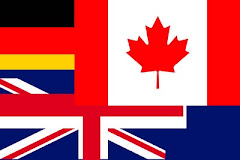For my readers who don't know who Elizabeth Shown Mills is, here is some background information.
Advanced Genealogical Skills: A Seminar with Elizabeth Shown Mills
One of North America=s most honoured and influential genealogists is visiting Toronto on 2 April 2011. The Ontario Chapter of the Association of Professional Genealogists and the Canadiana Department, North York Central Library [Toronto Public Library] proudly present a day-long seminar of advanced genealogical techniques and research methodology for experienced genealogists and committed family historians.
Elizabeth Shown Mills, CG, CGL, FASG, FNGS, FUGA, has been a leader in genealogical education for a quarter century, pushing the cutting edge of research methodology, standards, and quality, having served as president of both the Board for Certification of Genealogists and The American Society of Genealogists, and as an officer or trustee of other major organizations. During her 16 years as editor of the National Genealogical Society Quarterly, Elizabeth made that journal into the leading forum for the teaching of research methods and principles. For even longer, her Advanced Methodology Track at the Samford University Institute of Genealogy & Historical Research has been a rite of passage for serious family historians.
Among Elizabeth=s countless publications are the award-winning Evidence_ Citation & Analysis for the Family Historian and Professional Genealogy: A Manual for Researchers, Writers, Editors, Lecturers, and Librarians. They are considered Aabsolute essentials@ for both personal and professional genealogists. Her latest book, Evidence Explained: Citing History Sources from Artifacts to Cyberspace, earned Library Journal=s Best Reference designation in 2007.
A popular lecturer much in demand, Elizabeth is a featured speaker at major North American genealogical conferences. She also appears at academic, library, and archives events, and in media interviews. Her remarkable 2004 historical novel, Isle of Canes, Aa gripping tale of cultural and racial conflict, economic triumph and ruin, and unyielding family pride told against the backdrop of colonial and antebellum Louisiana,@ involved years of archival research.
At the seminar, Elizabeth will speak about professional techniques for dissecting and solving research problems, simplifying source citations, and finding female ancestors. Heralded by her peers as Athe genealogist who had the most impact in the post-Roots era,@ she offers a unique opportunity for sharpening your skills.
Advanced Genealogical Skills: A Seminar with Elizabeth Shown Mills
Date: Saturday, 2 April 2011
Place: Auditorium, 2nd Floor of the North York Central Library, 5120 Yonge St., Toronto
Time: The program begins at 9 a.m. and ends at 5 p.m.
Doors open at 8:30 a.m.
Cost: $45 public admission; $20 OCAPG members
Registration: Online at http://ocapg.org beginning 15 January 2011
(secure online credit card registration or payment by cheque/check.)
© 2010 Janet Iles




